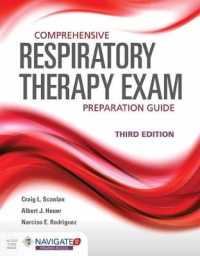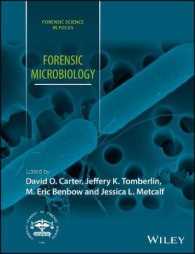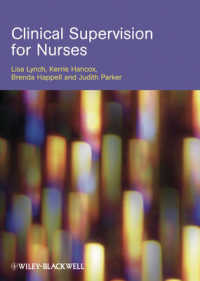- ホーム
- > 洋書
- > 英文書
- > Literary Criticism
基本説明
This study of 'improving' fiction produced in Ireland in the 19th century demonstrates how this pamphlet literature shaped the mainstream literary culture. While uncovering previously neglected material, O'Connell also sheds new light on the work of Maria Edgeworth, Mary Leadbeater, William Carleton, Thomas Davis, J. M. Synge, W. B. Yeats, and others.
Full Description
This is the first study of Irish improvement fiction, a neglected genre of nineteenth-century literary, social, and political history.Ireland and the Fiction of Improvement shows how the fiction of Mary Leadbeater, Charles Bardin, Martin Doyle, and William Carleton attempted to lure Irish peasants and landowners away from popular genres such as fantasy, romance, and 'radical' political tracts as well as 'high' literary and philosophical forms of enquiry. These writers attempted to cultivate a taste for the didactic tract, an assertively realist mode of representation. Accordingly, improvement fiction laboured to demonstrate the value of hard work, frugality, and sobriety in a rigorously realistic idiom, representing the contentment that inheres in a plain social order free of excess and embellishment. Improvement discourse defined itself in opposition to the perceived extremism of revolutionary politics and literary writing, seeking (but failing) to exemplify how both political discontent and unhappiness could be offset by a strict practicality and prosaic realism. This book demonstrates how improvement reveals itself to be a literary discourse, enmeshed in the very rhetorical abyss it sought to escape. In addition, the proudly liberal rhetoric of improvement is shown to be at one with the imperial discourse it worked to displace.
Helen O'Connell argues that improvement discourse is embedded in the literary and cultural mainstream of modern Ireland and has hindered the development of intellectual and political debate throughout this period. These issues are examined in chapters exploring the career of William Carleton; peasant 'orality'; educational provision in the post-Union period; the Irish language; secret society violence; Young Ireland nationalism; and the Irish Revival.
Contents
Introduction: The Aesthetics of Excess ; 1. 'False Refinement', Plain Speech, and Improved Writing ; 2. Improvement and Nostalgia: Society Schools and Hedge Schools ; 3. The Silence of Irish ; 4. Political Discipline and the rhetoric of Moderation ; 5. The Aesthetics of Excess: Improvement and Revivalism ; Conclusion







